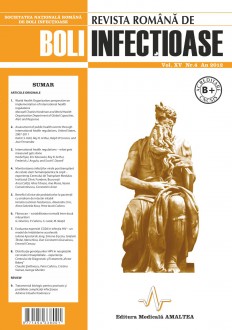SELECT ISSUE

Indexed

| |

|
|
|
| |
|
|
|

|
|
|
|
|
|
| |
|
|
HIGHLIGHTS
National Awards “Science and Research”
NEW! RJID has announced the annually National Award for "Science and Research" for the best scientific articles published throughout the year in the official journal.
Read the Recommendations for the Conduct, Reporting, Editing, and Publication of Scholarly work in Medical Journals.
The published medical research literature is a global public good. Medical journal editors have a social responsibility to promote global health by publishing, whenever possible, research that furthers health worldwide.
ASSESSMENT OF PUBLIC HEALTH EVENTS THROUGH INTERNATIONAL HEALTH REGULATIONS, UNITED STATES, 2007-2011
Katrin S. Kohl, Ray R. Arthur, Ralph O’Connor and Jose Fernandez
ABSTRACT
Under the current International Health Regulations, 194 states parties are obligated to report potential public health emergencies of international concern to the World Health Organization (WHO) within 72 hours of becoming aware of an event. During July 2007–December 2011, WHO assessed and posted on a secure web portal 222 events from 105 states parties, including 24 events from the United States. Twelve US events involved human influenza caused by a new virus subtype, including the first report of influenza A(H1N1) pdm09 virus, which constitutes the only public health emergency of international concern determined by the WHO director-general to date. Additional US events involved 5 Salmonella spp. outbreaks, botulism, Escherichia coli O157:H7 infections, Guillain-Barré syndrome, contaminated heparin, Lassa fever, an oil spill, and typhoid fever. Rapid information exchange among WHO and member states facilitated by the International Health Regulations leads to better situation awareness of emerging threats and enables a more coordinated and transparent global response.
